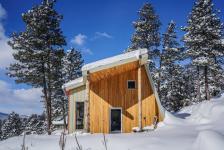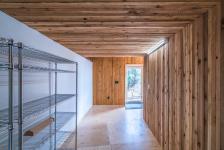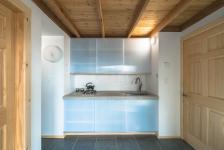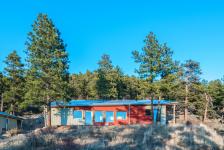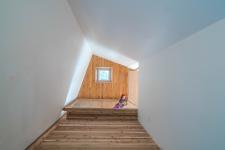Colorado’s first project to be certified by the Passive House Institute is an off-grid timber home located 2,000 meters up in the Front Range of the Rocky Mountains, near Fort Collins. The house’s pristine forest location inspired a building system with an emphasis on natural materials, that minimizes the use of foams and concrete.
The dwelling’s wedge shape provides good solar gain to the south, while also preserving adjacent Ponderosa pine trees, which in turn provide summer shading. Meanwhile, the north and east elevations evoke the distinctive local hogback mountain ranges, with the roof plunging into the ground — emulating a geological massing, which also creates unique internal spaces.
The main floor features an open plan living space, sunken shower, small kitchen, large bedroom, and workspace. The upper floor contains a small bedroom and storage area. A ‘net bed’ separates the two floors, but allows them to remain visually and acoustically connected — and provides for an occasional afternoon nap, too.
Inspired by contemporary Japanese homes, the floor plan is largely open to emphasise views, communication and natural light. The finishes are simple, natural and durable materials: plywood, cedar pickets, gypsum, slate and ceramic tiles. The workspace and upper bedroom features cedar nail-laminated wall and floor, allowing for a thin floor plate —thus increasing room height — and reducing the need for finish materials.
The construction consists of a lightweight timber framed interior wall, sheathed in airtight taped plywood. A larsen truss cavity filled with cellulose is encased to the exterior with mineral wool board. This assembly, along with tempered triple-glazed windows, fibre cement siding and the steel roof, is wildfire resistant and vapour open to the exterior.
Heating is supplied by a gas-fired hot water tank which is pre-heated by solar photovoltaic panels, with hot water delivered to wall-based heating pipes and a coil in the heat recovery ventilation (HRV) system. The HRV unit, located in the upper storage space, is oversized for the building volume and incorporates an earthtube system under the house, which helps to eliminate the need for electric pre-heating in cold weather. It also helps to cool incoming fresh air in summer. The project realizes a 90% reduction in space heating energy compared to code building standards.
And to eliminate the significant levels of foam and concrete typically used in a passive house foundation, the house was instead built over a crawlspace, with cellulose-insulated I-joists bridging the stem walls of the house.
2013
2016
Program 166 square meter interior, Main floor 1 bedroom, 1 bath, kitchen, great room, workshop, upperfloor 1 bedroom, storage. Home is first certified International Passive House in Colorado, USA.
Envelope have no foam products and minimal high embodied energy or synthetic materials. Finishes include drywall, plywood, ceramic and slate tile. Home is off grid solar voltaic with propane heat back up.
Average R values: Walls R 80, Roof R 100, Floor R63
Andrew Michler, Designer/Builder
John Parr, Builder

